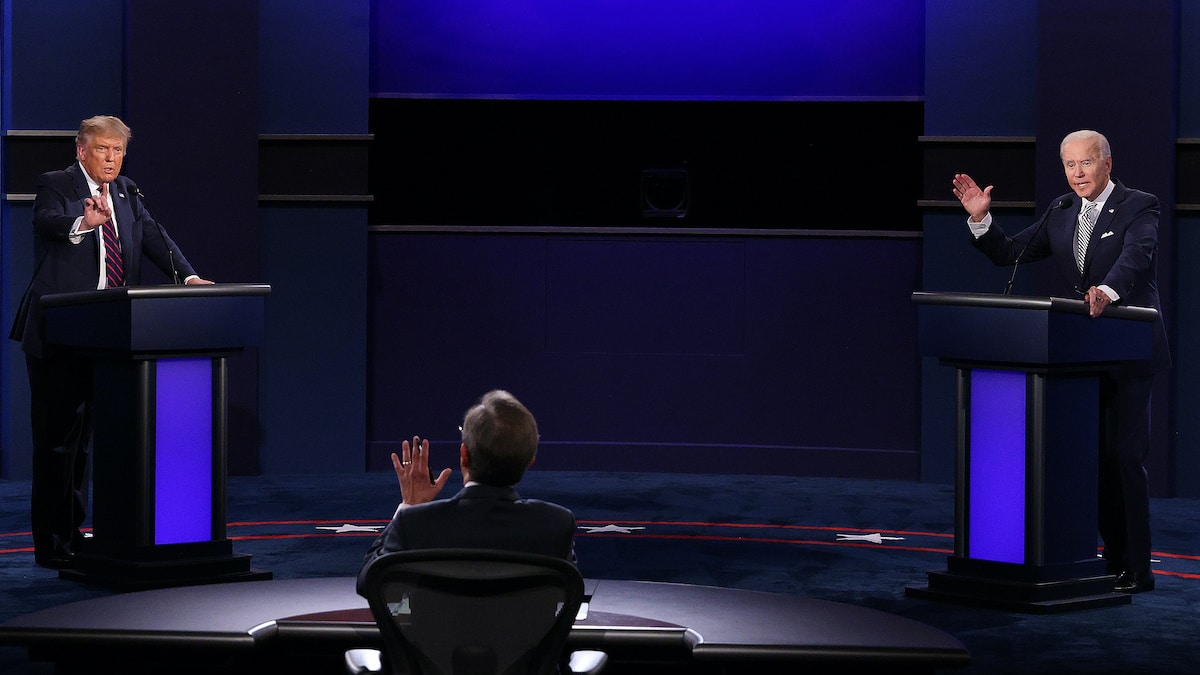

U.S. President Donald Trump and Democratic presidential nominee Joe Biden participate in the first presidential debate moderated by Fox News anchor Chris Wallace at the Health Education Campus of Case Western Reserve University on Sept. 29, 2020 in Cleveland, Ohio. Scott Olson / Getty Images
The first presidential debate seemed like it would end without a mention of the climate crisis when moderator Chris Wallace brought it up at the end of the night for a segment that lasted roughly 10 minutes.
The raucous event in Cleveland, Ohio was notable for President Donald’s Trump’s constant interruptions and bullying behavior as he spoke over the Democratic nominee, Joe Biden, and Wallace. “Mr. Trump purposefully and repeatedly heckled and blurted over his rival and the moderator alike in a 90-minute melee that showcased the president’s sense of urgency to upend a race,” is how Shane Goldmacher of The New York Times summarized the night.
It was with that backdrop that Wallace said toward the end of the evening, “I’d like to talk about climate change.” He then spoke about the forest fires in the West, turned toward Trump and noted that Trump said he doesn’t believe that science knows if the climate crisis is triggering record-setting wildfires.
“Over your four years, you have pulled the U.S. out of the Paris climate accord,” Wallace said. “You have rolled back a number of Obama environmental records. What do you believe about the science of climate change, and what will you do over the next four years to confront it?”
“I want crystal clean water and air, we now have the lowest carbon … if you look at our numbers now we are doing phenomenally,” Trump said in response. He then insisted that people are people are very happy he has started to withdraw the U.S. out of the Paris climate accord before turning the discussion to how states in the West need to improve their forest management.
That distraction from the question pushed Wallace to interrupt Trump. “What do you believe about the science of climate change, sir?” And then later in the segment, he asked, “Do you believe that human pollution, greenhouse gas emissions, contribute to the global warming of the planet?”
Trump said he did, to an extent, and then pivoted again to forest management.
As Trump spoke of the need to better manage the forests, Biden looked bemused, often laughing at the president’s answers and shaking his head.
“But sir, if you believe in the science of climate change, why have you rolled back the Obama Clean Power Plan, which limited carbon emissions in power plants? Why have you relaxed fuel economy standards that are going to create more pollution from cars and trucks?” Wallace asked.
Trump dismissed that idea, insisting that more new cars will be bought which will make them safer.
When Biden had a chance to speak about his trillion green energy plan, the former vice president spoke about his track record in bringing down the cost of renewable energy and said that coal-fired and oil-fired power plants were going extinct in America.
He also spoke of replacing the federal automotive fleet of vehicles with electrical vehicles. He mentioned a plan to weatherize millions of buildings and homes to reduce the need for both heating and air conditioning. He then insisted the country could reach net-zero emissions in 15 years while creating millions of jobs to overhaul the country’s energy infrastructure.
When Trump tried to tie Biden to the yoke of the Green New Deal and erroneously labeled the price tag at 0 trillion, Biden insisted that his plan was not the Green New Deal, but his own.
Discussing the costs, Biden pointed to the steep price tag of ecological disaster.
“We spend billions of dollars now, billions of dollars, on floods, hurricanes, rising seas,” he said. “We’re in real trouble.”
The pivot toward the climate crisis was a surprise. Before the debate, Wallace, a Fox News host, had said the debate would focus on a handful of topics: the Supreme Court, the coronavirus pandemic, the economy, election integrity and “race and violence in our cities,” according to The Washington Post.
The omission of the climate crisis was striking, as activists worried that debate moderators would ignore the number one issue today to young people, just as it was in the 2016 debates, according to The Washington Post.
The omission also raised the ire of Democratic lawmakers. Prior to the debate, 40 Democratic senators sent a letter to the debate commission insisting upon questions that address the climate crisis.
“Without these topics, any discussion on the economy, racial justice, public health, national security, democracy, or infrastructure would be incomplete,” said the letter, as The Washington Post reported.
- Green Groups Blast Debate Moderators for Asking Zero Climate ...
- 11 Times Trump Said 'Climate Change Is a Hoax' - EcoWatch
- Trump and Biden Spar Over Climate Crisis at the End of Final Debate - EcoWatch

 233k
233k  41k
41k  Subscribe
Subscribe 